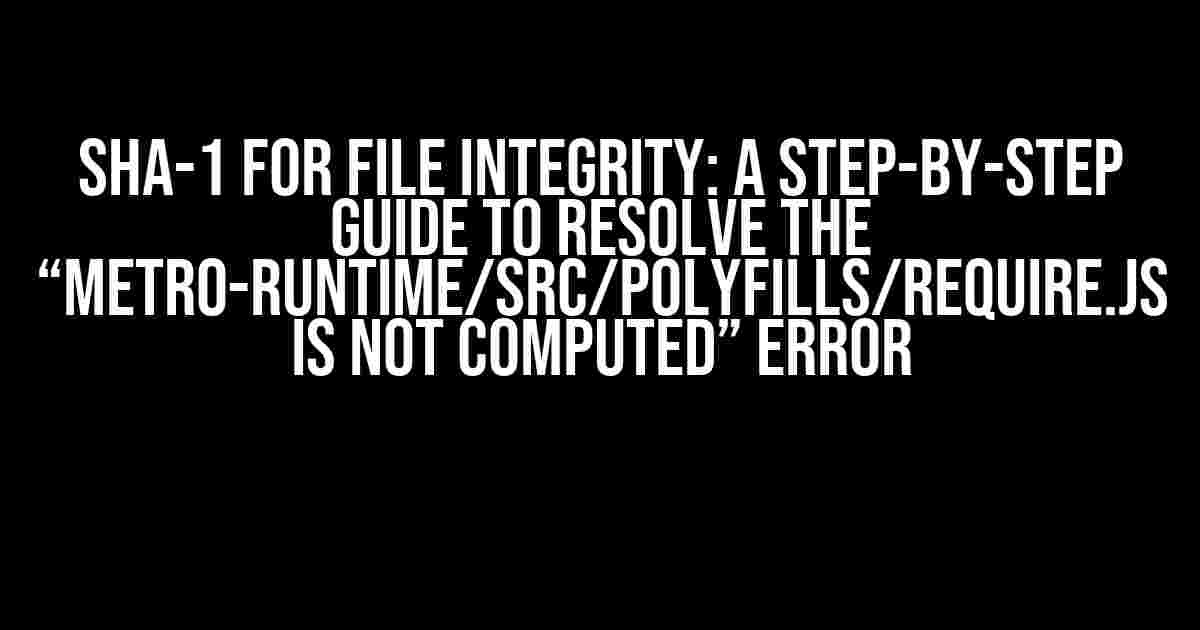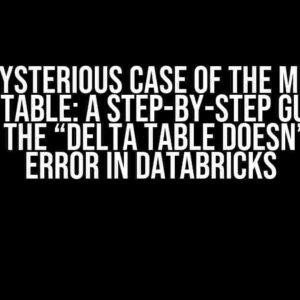Are you tired of encountering the frustrating “SHA-1 for file ….node_modules/metro-runtime/src/polyfills/require.js is not computed” error in your project? Worry no more! In this comprehensive guide, we’ll delve into the world of SHA-1, file integrity, and how to resolve this pesky error once and for all.
What is SHA-1?
SHA-1 (Secure Hash Algorithm 1) is a cryptographic hash function that produces a 160-bit hash value from variable-length input data. It’s commonly used to ensure the integrity of files and data by creating a digital fingerprint that can be compared to the original data. In the context of file systems, SHA-1 is used to verify the authenticity and integrity of files during transmission or storage.
Why is SHA-1 important for file integrity?
SHA-1 plays a crucial role in ensuring the integrity of files by:
- Verifying file authenticity: SHA-1 helps ensure that the file you receive is the same as the original file, without any modifications or tampering.
- Detecting data corruption: SHA-1 can detect even the slightest changes to the file, making it an effective way to identify data corruption or tampering.
- Preventing file manipulation: By using SHA-1, you can prevent unauthorized access or modifications to sensitive files.
The “metro-runtime/src/polyfills/require.js is not computed” Error: What’s Causing It?
The “SHA-1 for file ….node_modules/metro-runtime/src/polyfills/require.js is not computed” error typically occurs when the SHA-1 hash value for the require.js file in the metro-runtime package is not generated or computed correctly. This can happen due to various reasons, including:
- Corrupted or incomplete file downloads
- Inconsistent file system permissions
- Outdated or incompatible package versions
- Misconfigured project settings or dependencies
Resolving the “metro-runtime/src/polyfills/require.js is not computed” Error
Now that we’ve identified the possible causes, let’s dive into the step-by-step guide to resolve this error:
Step 1: Verify File Integrity
First, ensure that the require.js file is intact and free from corruption. You can do this by:
// Check the file size and integrity
ls -l node_modules/metro-runtime/src/polyfills/require.js
If the file size or integrity appears suspicious, try re-downloading the package or reinstalling the metro-runtime package:
// Reinstall the metro-runtime package
npm uninstall metro-runtime
npm install metro-runtime
Step 2: Update Package Dependencies
Outdated or incompatible package versions can cause issues with SHA-1 computation. Ensure that all dependencies are up-to-date by running:
// Update package dependencies
npm update
Step 3: Configure Project Settings
Review your project settings and dependencies to ensure that they are correctly configured. Check for any misconfigured settings or dependencies that might be causing the error.
Step 4: Recompute SHA-1 Hash Values
To recompute the SHA-1 hash value for the require.js file, use the following command:
// Recompute SHA-1 hash value
sha1sum node_modules/metro-runtime/src/polyfills/require.js
This will generate a new SHA-1 hash value for the file. Compare this value with the original hash value to ensure it matches.
Step 5: Verify File Permissions
Ensure that the file system permissions are set correctly for the require.js file. You can do this by:
// Check file permissions
ls -l node_modules/metro-runtime/src/polyfills/require.js
If the permissions appear incorrect, adjust them accordingly to ensure that the file is accessible and readable.
Conclusion
In conclusion, the “SHA-1 for file ….node_modules/metro-runtime/src/polyfills/require.js is not computed” error can be resolved by verifying file integrity, updating package dependencies, configuring project settings, recomputing SHA-1 hash values, and ensuring correct file permissions. By following these steps, you’ll be able to resolve this error and ensure the integrity of your files.
| Step | Description |
|---|---|
| 1 | Verify file integrity |
| 2 | Update package dependencies |
| 3 | Configure project settings |
| 4 | Recompute SHA-1 hash values |
| 5 | Verify file permissions |
By following this guide, you’ll be well-equipped to tackle the “metro-runtime/src/polyfills/require.js is not computed” error and ensure the integrity of your files. Remember, SHA-1 is an essential tool for maintaining file integrity, and with the right steps, you can resolve even the most stubborn errors.
Here are 5 FAQs about “SHA-1 for file ….node_modules/metro-runtime/src/polyfills/require.js is not computed” in a creative voice and tone:
Frequently Asked Questions
Got stuck with the pesky “SHA-1 for file ….node_modules/metro-runtime/src/polyfills/require.js is not computed” error? Don’t worry, we’ve got you covered! Check out these FAQs to get your project up and running in no time!
What does the “SHA-1 for file ….node_modules/metro-runtime/src/polyfills/require.js is not computed” error even mean?
This error occurs when your system is unable to compute the SHA-1 hash for the require.js file in the metro-runtime package. This is often due to issues with file permissions, corrupted files, or conflicts with other dependencies.
Why is the require.js file so important anyway?
require.js is a critical file in the metro-runtime package, as it allows for the dynamic loading of JavaScript modules. Without it, your project won’t be able to function properly. Think of it as the glue that holds your project’s dependencies together!
How do I fix the “SHA-1 for file ….node_modules/metro-runtime/src/polyfills/require.js is not computed” error?
Try deleting the node_modules folder and running npm install or yarn install again to reinstall the dependencies. If that doesn’t work, try updating your dependencies or checking the file permissions to ensure that the file system has access to the require.js file.
What if I’m still getting the error after trying the above solutions?
Don’t panic! In this case, it’s possible that there’s a deeper issue with your project’s configuration or dependencies. Try checking the metro-runtime package documentation for specific troubleshooting steps or reach out to a fellow developer for assistance.
Is there a way to prevent this error from happening in the future?
Yes! To avoid this error in the future, make sure to regularly clean up your node_modules folder by running npm uninstall or yarn uninstall, and then reinstalling the dependencies. This will help keep your project’s dependencies in check and prevent issues like this from arising.



